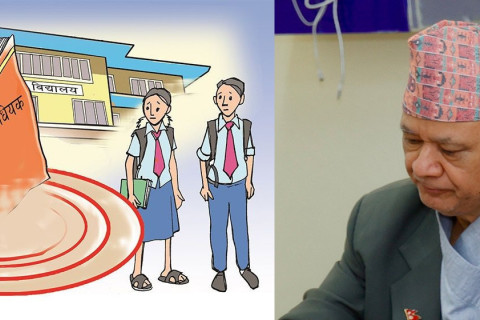KATHMANDU, Aug 17: The bill for a new act regarding school education, which is being introduced after 54 years, is under threat. At times, community school teachers and at other times, private school operators have been threatening the government to propose a bill that favors their interests.
Private school operators have even threatened to shut down schools nationwide if the education act is not tailored to their interests. However, students and parents, who are the primary stakeholders in the act, remain silent. Taking into account the demands and concerns of both community school teachers and private schools, the Parliamentary Committee on Education, Health, and Information Technology had agreed and passed the proposed education bill on August 7.
Although the bill passed by the committee was supposed to be presented in the House of Representatives by Minister for Education, Science, and Technology (MoEST) Raghuji Pant, it has stalled within the committee due to threats from private school operators and community school teachers. Private school operators want to reverse the provisions related to private schools in the education bill, while community school teachers are pressuring for arrangements based on periodic promotions and appointments determined by 75 percent internal competition.
However, educationist Dhananjay Sharma has analyzed that the education bill is poorly structured. According to him, if school education is to operate according to contemporary times and circumstances, teacher recruitment should be conducted through open competition. Currently, the bill proposes recruitment based on 60 percent internal and 40 percent open competition, which Sharma considers incorrect. Community school teachers disagree with this arrangement, demanding recruitment based on 75 percent internal and only 25 percent open competition.
Teachers' strike to affect 6 million students at govt schools t...

“In reality, the main party that should be protesting is the service recipients, i.e., the students, but they cannot protest,” says Sharma, a former principal of Gyanodaya Secondary School, Bafal, Kathmandu. “At the very least, the 2028 BS Education Act was organized and clear. However, the current education bill in the parliamentary committee is disorganized. It does not clearly regulate teacher promotion, posting, or tenure. The proposed arrangement of 60 percent internal and 40 percent open competition for teacher recruitment restricts entry for competent, capable, and young teachers. Why is the state silent on this?”
According to him, to improve school education and maintain quality, the Teacher Service Commission (TSC) should conduct exams for teacher recruitment without age restrictions for experienced teachers and allow recruitment entirely through open competition. He argues that teachers who do not even know how to operate mobile devices cannot effectively teach the new generation in classrooms.
Another educationist, Bidyanath Koirala, states that the education bill has been threatened due to teachers being affiliated with political parties. “Political parties did not allow teachers to become real teachers; they turned them into party workers for votes and money, which is why the school education bill is under threat today,” Koirala said. “If the education bill passed by the committee becomes an act, it will not improve school education; it will only fulfill teachers’ demands.”
According to him, the TSC should issue advertisements for teacher positions regularly, political parties must stop turning teachers into party workers, and the bill should ensure that teachers serve the schools. The law should allow recruitment entirely through open competition without age restrictions for experienced candidates.
Private schools have once again raised objections to the bill passed in cooperation with them after the parliamentary committee amended the subcommittee report. Krishna Prasad Adhikari, chair of the Private and Boarding Schools’ Organization Nepal (PABSON), and Subhas Nyaupane, chair of the National Private and Boarding Schools’ Organization Nepal (NPABSON), jointly held a press conference on Thursday, announcing various protest programs against the bill’s provisions.
“If no solution is reached, we have decided on a protest up to school closures,” Adhikari told Republica. “Under the bill’s provisions, no private school can provide scholarships, including boarding facilities. The clause stating that private schools will gradually become non-profit should also be removed. We operate as companies, so this clause is unnecessary. Only the existing 10 percent scholarship, including admission fees, annual fees, and monthly tuition, should be maintained. Private schools cannot bear expenses related to boarding, meals, clothing, or transport.”
The bill passed by the parliamentary committee stipulates that private schools will gradually transition to service-oriented, public welfare, and non-profit institutions. It also requires private schools to provide 50 percent scholarships to disadvantaged students and 50 percent to meritorious students. Private schools with fewer than 500 students must provide 10 percent, those with more than 500 students must provide 12 percent, and schools with more than 800 students must provide up to 15 percent scholarships, including residential facilities.
According to educationist Sharma, the bill also fails regarding private school management. The constitution already guarantees free and compulsory education up to Grade 8 and free education up to Grade 12. Therefore, the law should make the state responsible for private school students as well. “The government does not have the courage to close private schools. It does not have the capacity to return private investments,” Sharma said. “It is acceptable to gradually move private schools to a trust system. Prestigious schools like LA, LRI, Budhanilkantha, and Siddhartha Vanasthali are already run as trusts and charge fees. Therefore, the bill must include clear provisions.”
Educationist Koirala also notes that the government cannot afford the financial burden of private school students. “For those who want to go into trusts, attractive facilities can be provided. For profit-making schools, teachers’ salaries, benefits, profits, and expenses must be clearly defined,” Koirala said. “The main problem lies with private school scholarships. Local authorities must cover students’ expenses under the act, and then private schools will not look for loopholes.”





































